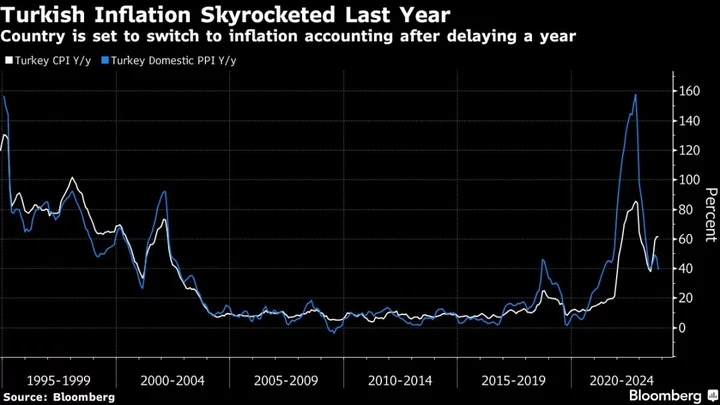Turkish businesses grappling with the fastest price rises in two decades are finally preparing to switch to a system of inflation accounting which should give a clearer picture of their earnings.
The move will boost the taxable income of companies whose balance sheets are loaded with illiquid assets such as property and those that borrowed heavily as President Recep Tayyip Erdogan’s previous government focused on providing cheap corporate loans ahead of key elections last May. Smaller companies that relied more on equity than debt should have a lower tax liability, reflecting their revised balance sheets.
Businesses have been lobbying for the move for months, noting that failing to take account of inflation results in unjust taxation of profits. The problem has stemmed from Turkey’s insistence on keeping interest rates low in the runup to this year’s presidential vote, a policy that triggered the spike in prices.
“It’s not fair to tax the fictitious, paper increase in profits due to the inflationary environment,” said Sekib Avdagic, head of the chamber of commerce in Turkey’s largest city. Inflation accounting has become an “imperative” that would help halt the erosion of capital, he said.
Inflation accounting involves adjusting financial statements to reflect the impact of extreme price changes on purchasing power and profitability, and affects the tax treatment of so-called non-monetary assets. “It will provide a clearer, more realistic earnings picture,” said Tuna Cetinkaya, general manager at Istanbul-based Colendi Securities.
Turkish standards require a three-year cumulative domestic producer price inflation of about 100% and a more than 10% increase in prices in a given period in order for the system to be used.
Those levels have already been breached, with annual domestic producer price inflation accelerating past 150% in 2022, but the government delayed implementation. The domestic producer prices index saw a 426% surge over the past three years through October.
Earnings Makeover
The last time Turkey required companies to accommodate balance sheets to high inflation was in 2004. That itself is an added complication, as the new rules will be at best a distant memory for corporate finance executives.
Implementation is expected to continue through 2026, considering the government’s medium-term program which foresees inflation returning to single digits only at the end of that year, according to the Treasury and Finance Ministry. Annual consumer price acceleration was above 61% as of October.
As corporate earnings undergo a makeover, everything from tax payments to dividends and valuation multiples, such as price-to-earnings and price-to-book ratios, will be affected. “The adjustments will directly impact taxable income,” said Murat Alsan, head of KPMG Turkey.
Price growth in Turkey has been in double digits almost without interruption since 2019, but skyrocketed last year to the highest in nearly a quarter-century as the central bank started cutting rates months after Erdogan removed a hawkish governor in March 2021. A spike in energy costs after Russia attacked Ukraine didn’t help the energy-importing nation.
Impact on Valuations
Listed companies including power producer Zorlu Enerji, polyester manufacturer Sasa, state-run Turk Telekom, mobile phone company Turkcell, confectionary maker Ulker and carmakers Otokar and Ford Otosan are among those that could see taxable incomes rise with the move, according to analyses by Istanbul-based Oyak Securities and Vakif Investment.
Companies such as apparel maker Mavi Giyim, renewable energy producer Galata Wind and canned food company Tukas are expected to report more modest earnings with the shift due to lower non-monetary asset-to-equity ratios and lower financial debt, according to the brokerages.
Turkey’s benchmark Borsa Istanbul 100 Index is currently trading at 4.3 times its estimated 2024 earnings, at a 63% discount to the MSCI Emerging Markets Index. Corporate profits have climbed as consumer prices rocketed in the past few years, making valuations even more appealing for domestic investors, who rushed into equities in a bid to hedge savings against inflation.
Many foreign-owned companies have already made the switch for their local units. Garanti BBVA, Turkey’s second-biggest lender by market value, reported net income of 23.4 billion liras ($812 million) in the third quarter, but its parent Banco Bilbao Vizcaya Argentaria SA accounted for it as a loss of 158 million euros after adjusting for inflation and higher taxes.
Financial Firms
Earlier in November, Treasury and Finance Minister Mehmet Simsek said the government may exclude financial institutions from the planned switch, without giving further details.
Lenders’ total net income rose by more than 650% since the end of 2020 through September to nearly 440 billion liras, according to regulatory data. Earlier this year, the government raised corporate taxes on banks, insurers and brokerages to 30% from 25%.
Inflation accounting would deflate banks’ profitability due to the limited level of non-monetary assets they have, also leading to a lower tax base, according to Cihan Saraoglu, an analyst at HSBC Securities in Istanbul. That kind of impact on tax collection may result in postponement of the adoption of inflation accounting by banks, according to KPMG’s Alsan.
--With assistance from Firat Kozok.
Author: Tugce Ozsoy, Taylan Bilgic and Inci Ozbek

